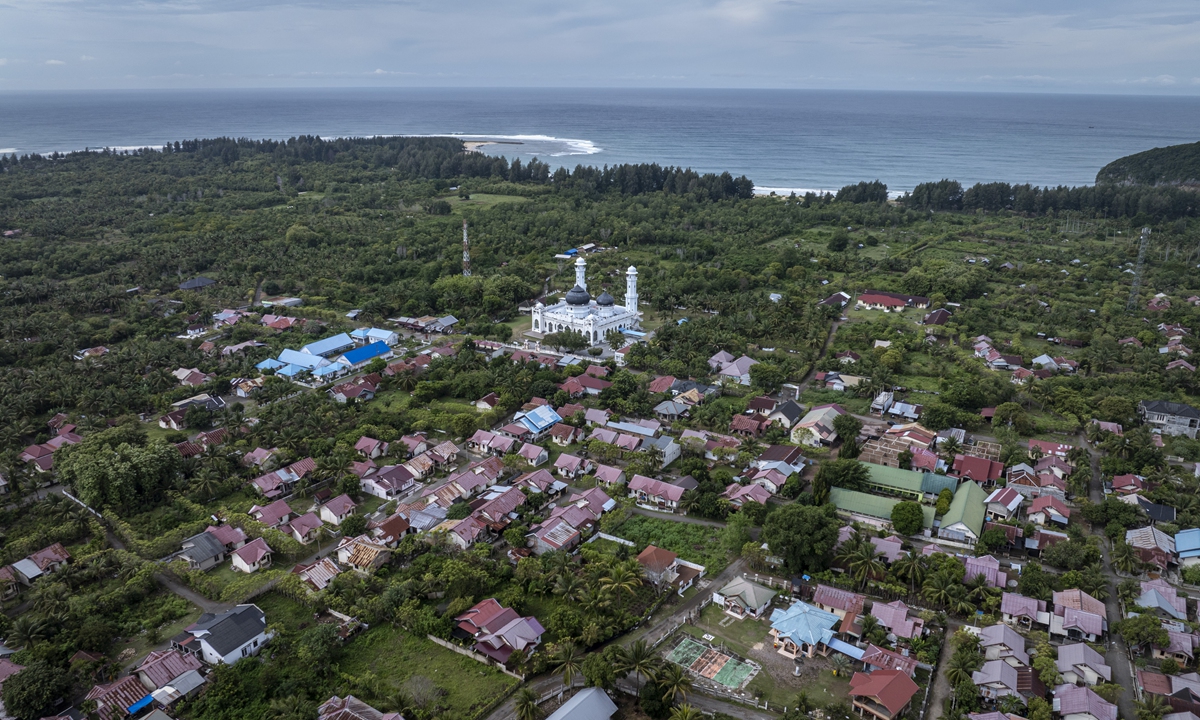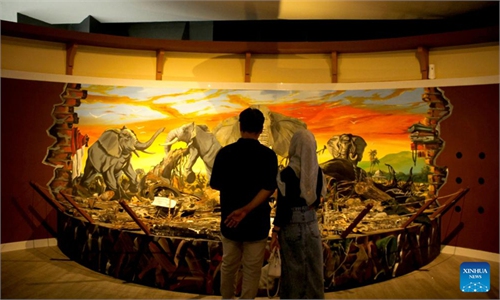
A view of a region in Aceh Besar, one of the areas worst hit by the 2004 tsunami, ahead of the twenty-year anniversary of the disaster on December 24, 2024 in Aceh province, Indonesia. Photo: VCG
Thursday marks the 20th anniversary of the tragic Indian Ocean tsunami. As we honor those lost, we are also humbled to reflect on the progress made in creating resilient coastal communities.That fateful day galvanized unprecedented global solidarity, cooperation and innovation in disaster preparedness. Early warning systems and public awareness of tsunamis have made significant progress, mostly thanks to regional cooperation.
Scattered across the coastlines today are visible investments in warning and evacuation systems. With regular tsunami drills, sirens sound in multiple languages and children are trained to lead their families to safety. Vertical shelters stand out along popular beaches, with standardized evacuation route signage pointing the way. Homes are equipped with ready-to-go grab bags packed with important documents, medication, torches and batteries. Livestock are also brought to higher ground, and boats stay out in the deep sea, safeguarding livelihoods.
From tragedy to transformation
In the aftermath of the tsunami, governments and international partners united to establish the Indian Ocean Tsunami Warning and Mitigation System.
With Australia, Indonesia and India as regional tsunami service providers, 27 national tsunami warning centers can now receive tsunami threat alerts within 10-15 minutes of a seismic event.
More than 75 percent of coastal communities in high-risk areas have access to tsunami early warning information compared to less than 25 percent in 2004; and community preparedness programs like the UNESCO-IOC Tsunami Ready Program and UNDP Tsunami Project are empowering local leaders, schools and residents with life-saving knowledge.
Moreover, advances in multi-hazard early warning systems have enabled better integration of tsunami preparedness with flood, cyclone and other coastal hazards preparedness.
Still, the challenges have grown more complex. Climate change is amplifying the frequency and severity of water-related disasters, with impacts that often cascade with, and compound, geophysical disasters such as earthquakes and volcanoes.
The rising tide of risk
This story of resilience is far from complete. The Economic and Social Commission for Asia and the Pacific estimates that around 68 million people in 43 Asian and Pacific countries and $2.3 trillion in building stock around our ocean basins are at significant risk. In the Indian Ocean basin alone, 1,213 education facilities and 1,450 health facilities, 140 power plants and 1,217 seaports of Asian countries are exposed along the coast.
Taking a multi-hazard approach, our lessons for the future of coastal resilience should reflect a concerted effort to prioritize sustained financing. Second, regional cooperation should be used to leverage institution building. There should also be concerted efforts to share data and technological innovation, which remain critical to enhancing hazard monitoring and prediction.
Last but not least, communities should be equipped and empowered to ensure that resilience is built from the ground up for all.
Strengthening resilience: a regional imperative
Our commemoration of the 2004 Indian Ocean tsunami is a solemn reminder of our shared vulnerability and interdependence.
It also demonstrates the power of collaboration in overcoming adversity.
As we remember that fateful day, let us honor the memory of those lost and commit to a future where coastal communities are resilient, early warnings reach everyone and disasters no longer devastate lives and livelihoods.
The author is an under-secretary-general of the United Nations and Executive Secretary of the Economic and Social Commission for Asia and the Pacific. opinion@globaltimes.com.cn

